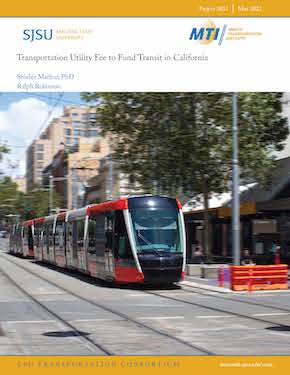- 408-924-7560
- mineta-institute@sjsu.edu
- Donate
Transportation Utility Fee to Fund Transit in California
Public transit is a key tool to reduce greenhouse gas (GHG) emissions to combat climate change; improve safety for pedestrians, cyclists, and drivers; and expand accessibility and mobility for all. However, we can only realize this potential by making sufficient investments to provide transit service levels that attract and retain greater ridership. To help with this needed investment, a handful of local governments have turned to transportation utility fees (TUFs), primarily collected as a monthly charge on customers' utility bills or property tax bill. While more widely used to support street maintenance, this study identifies six case studies where TUF revenues have been used to support transit or active transportation modes. This study closely examines the legal enabling environment for TUFs, the fee calculations methodology, the eligible uses, and other critical details about how these fees work. This study concludes by investigating the feasibility of employing TUFs in California to support public transit and meet the state's GHG emissions reduction goals.
SHISHIR MATHUR, PHD
Dr. Shishir Mathur is an MTI Research Associate and a Professor of Urban and Regional Planning at San Jose State University. He served as Associate Dean of Research (College of Social Sciences) during 2016-2019 and the Director of the Certificate in Real Estate Development during 2016-2020. His research interests include transportation finance, urban and real estate economics, affordable housing, international development, infrastructure and development finance, and growth management. His research has been published in top-tier journals such as Transportation Research Part A, Transport Policy, Journal of Planning Education and Research, Urban Studies, Land Use Policy, Cities, and Habitat International. He is the author of two books: Understanding India’s New Approach to Spatial Planning and Development: A Salient Shift? (Oxford University Press) and Innovation in Public Transport Finance: Property Value Capture (Routledge). He is currently working on his third book, Development Charges to Fund India's Urban Development (Cambridge University Press). Dr. Mathur has advised several international and national organizations. United Nations Human Settlements Programme (UN-HABITAT) sought his input on ways to encourage land-based financing in Africa, Asia, and South America. He advised Federal Transit Administration on ways to promote land value capture to fund transit-oriented developments and transit infrastructure.
RALPH ROBINSON
Ralph Robinson is an Assistant Planner with Good City Company. He completed his Master’s in Urban Planning at San José State University (SJSU), where he was recognized with an American Planning Association (APA) Outstanding Planning Student Award and a department service award. Furthermore, he received an honors designation for original research on the benefits of municipal energy utilities in California. He has worked on various projects through the Mineta Transportation Institute related to transportation financing, walkability, and sustainability in the Bay Area. While at SJSU, he also worked as a project coordinator with CommUniverCity on a robust assessment of a historically underserved Eastside San José community, a project that was recognized with both a 2020 San Francisco Bay Area Planning and Urban Research Association (SPUR) Impact Award and an Award of Excellence by the APA California Chapter Northern Section. He previously earned his bachelor’s in Geography from the University of Richmond in Virginia.
-
Contact Us
San José State University One Washington Square, San Jose, CA 95192 Phone: 408-924-7560 Email: mineta-institute@sjsu.edu






